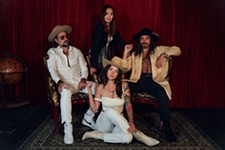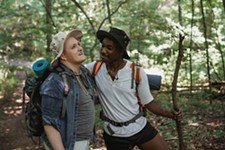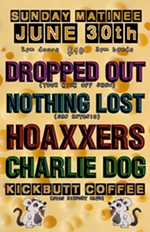Equality
Harmolodicizing with Ornette Coleman
By Raoul Hernandez, Fri., Nov. 12, 2004

"Maybe distance. I can't think of any problem about it. I don't remember speaking to anyone about a booking in Austin."
With that, 74-year-old Fort Worth native Ornette Coleman explained away a decade's worth of UT's Performing Arts Center valiantly trying to import one of the true Texas music titans, jazz's last great revolution. Sunday, 7pm, Bass Concert Hall, that upheaval upends Austin for the first time in probably three decades, though if Coleman's performance resembles his gift to the 2003 New Orleans Jazz & Heritage Festival, Sunday's uprising will be one of pure lyricism (austinchronicle.com/issues/dispatch/2003-05-02/music_phases.html ).
Speaking from New York, the saxophonist/trumpeter/violinist whose untethered sense of melody and harmony changed modern music forever – from John Coltrane to the Minutemen – was soft-spoken, kindly, with a gentle authority as unassuming as a handshake.
Austin Chronicle: When was the last time you played in Austin?
Ornette Coleman: Oh. It's been quite a while. It's been at least 20 years.
AC: Do you remember the occasion?
OC: I think it was a festival they were having. I think I was with a church band.
AC: This was in the Eighties?
OC: No, it's even further back than that.
AC: In addition to your son Denardo on drums, live, you'll be accompanied by two bass players here in Austin, correct?
OC: Yeah, I've been working on a system of music where any instrument can have equal relationship to the results of whatever melody a person is playing in relation to the arrangement. I call that "Harmolodic."
What it's based on is that in Western culture there are four basic instruments, an F instrument, a C instrument, a D-flat instrument, and an A-flat instrument, which represent the piano, the brass, the woodwind, and the strings. In the concert instrument, which is the piano, the brass, strings, and bass play a different note for the unison note on the piano. When you play those same four notes, they're four different notes, but when you play them as the instruments, you're playing as the same sound. It's like if it's in the key of E-flat, it's like playing four E-flats, but as far as individual sounds, it's C, E-flat, F, and F-sharp on the instruments that would be in unison with the piano. I named that concept "Harmolodic," which means it's vocally or instrumentally equal to an idea.
Mostly, the way music is played collectively is that you write the melody and someone writes a harmony part. Or you write the melody and someone plays the changes. In this case, the harmony, changes, and melodies are all equal in relationship to an idea.
The rest of the way we play music in Western culture is that someone is leading and someone is following. In the music that I play, I tell the musicians that are playing with me, "Your idea fits equal to mine or it can be better." The way it has been, the piano player is the person sitting down and feeding everybody – feeding little babies their milk. There's nothing wrong with that, but for me it's limited and it's not very democratic.
The democratic way of Harmolodics is to allow everyone the same opportunity to make the mistakes you're making.
AC: [Laughs] Did the theory of Harmolodics come to you all at once, or over a period of time?
OC: It's been about 20 years now, and the reason why it happens this way is because I've always tried to use different instrumentation. You know, people that play the French horn, and everything like that. Usually, when you write a melody, sometimes some melody is someone else's harmony, and sometimes, someone else's harmony is someone else's changes.
But when it comes to the idea, if everyone is talking at the same time, and they're not saying the same thing, no one understands what they're saying. But if everyone is talking about the same subject, and still talking different, they all understand where you are in relation to the subject. Western music – music in general – hasn't really reached that kind of freedom yet, simply because you have a leader standing out above everyone else. I don't think I'm the leader, I'm just paying the bills.
AC: How did growing up in Fort Worth affect your musical development?
OC: When I grew up in Fort Worth, there was segregation, so if that's what you mean, I'd start with that. It didn't affect my brain, it just affected the fact that there were rules that you couldn't participate with other human beings, because of their race. And I'm not talking about segregation as a racial issue. I'm talking about it as an intellectual issue.
Back then, Fort Worth's main enterprise was the packing industry. Two very large packing houses in Fort Worth distributed all of the meat sources that the country devours. So most of the music in Fort Worth was hillbilly music, or country & western music. ...
The way it affected me was not finding people I could play with. That's the only effect I felt. When I was working/playing by myself, it didn't bother me, but when I tried to go out and play with other people ... although I played with Bob Wills & the Texas Playboys.
I mean, I never really thought about segregation, I just went and played with whoever I could play with. I let them play with me. The styles were what were so rare. Bebop wasn't a big style in Texas when I was coming up. Rhythm & blues, rock & roll, and country & western were.
AC: Were those idioms interesting to you as a young musician?
OC: I think they still are, because they're just ideas, and if you're allowed to express an idea in any environment that inspires you, you can bring more to that particular melody line than just repeating the revolution of the chords.
AC: You played with Bob Wills!
OC: Yeah, long ago. I also played with Stan Kenton's big band in Fort Worth. I think that was in the Fifties.
Most of the country & western guys used to come to a place called the Jim Hotel where they had jam sessions. Most all the rhythm & blues and jazz guys would go there.
AC: What do you remember about playing with Bob Wills?
OC: You won't believe this, but they were playing more bebop than they were playing country & western!
AC: At Jazz Fest last year, your set was like one long sigh from your horn. Elder jazz statesmen seem to bring every moment of their lives to their playing.
OC: I really think age doesn't have anything to do with an idea. And the idea itself is kinda like a nucleus – a part of something activating things to be more clear about how they work. The emotional part of music, which has to do with sadness and blues – those kind of things – those are styles that people express how they feel with their words.
But in instrumental music, the idea comes from how free you can use your instrument to express an idea that the key, the chord, and the changes won't get in the way of. You don't have to translate a note into language when you're playing an instrument the way you have to do it when you're singing.
AC: Conventional wisdom is that you were the last revolution in jazz.
OC: The word "revolution," I know that it has some cultural value, but I think every day that you get up is a revolution. If something comes on the market that outdates something else, then you have to adjust to it, because whatever you're trying to do for your survival depends upon your adjusting to that so that those things you have done in the past won't be lost in the future. When you say "revolution," it means advancing the qualities that gives human beings more leverage to appreciate each other.
AC: In that sense, do you feel that your career, your playing, has been revolutionary?
OC: Ummm, I wouldn't want to say "yes," and I wouldn't want to say "no," but I think the word "revolutionary" carries a gun. No, I wouldn't want to classify it like that.
AC: Are you comfortable with the term that's been attached to your music, "free jazz"?
OC: That's one thing that's good about America: Labels haven't gotten in the way of anything you do. People can try and relate to the quality of what that label is for themselves. I don't think "free jazz" is a bad term. There's nothing wrong with using the word "free" for anything that you can label it as, because all it does is make you aware that it doesn't get in your way.
AC: What about the idea of music as a conduit to the divine?
OC: Yeah, I know that – it's not a bad idea. It's obvious that the Bible is the spiritual music of ideas. Anything that gives you information without you seeing it or being able to see it is some form of what we call intelligent information. For some reason, the only way human beings can express that is through sound. The only thing is there's probably not a sound that everyone can know what it means and how it feels because of language. But they can know how it affects them.
AC: Is music the way human beings entreat God?
OC: I think you have to ask God that.
AC: I'm just hoping not to do it in person anytime soon.
OC: [Laughing] Yeah, right. ![]()
Ornette Coleman plays the Bass Concert Hall Sunday, Nov. 14, 7pm. Tickets: www.utpac.org or 477-6060.








